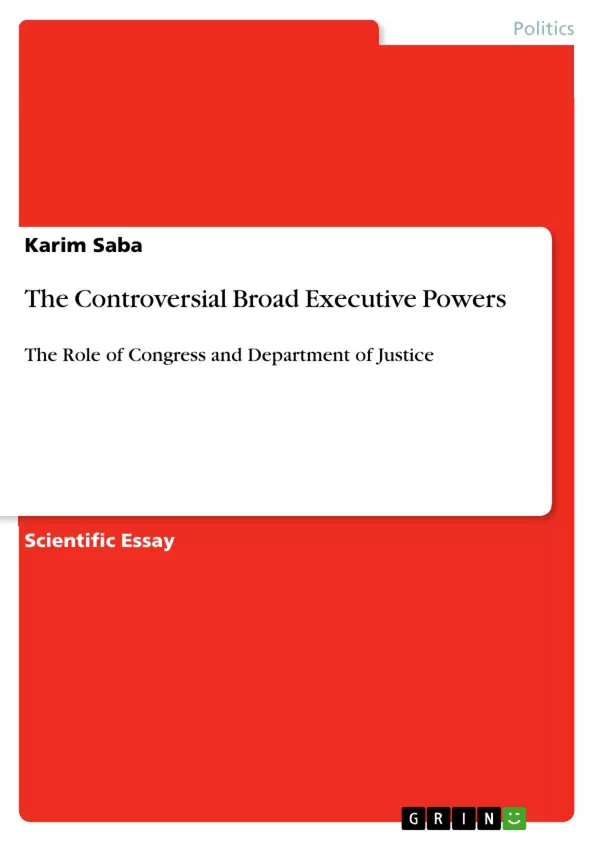Main argument in the paper is that the increase in the presidential power does not always mean the President is eager to increase his powers in order to achieve a unilateral system, as the majority of the scholars postulate I reflected other reasons that pushed the executive power to increase, such as the media and the nature of the internal affairs. However, mainly it comes from two reasons: Congress that is not exercising its full powers of checks and balance; and an Attorney General who does not counsel the President when the President exceeds the powers vested into his position.
Inhaltsverzeichnis (Table of Contents)
- INTRODUCTION
- HISTORIC LITERATURE
- REASONS BEHIND THE CONTINUOUSLY INCREASING PRESIDENTIAL POWERS
- I-The Presidency and the Congress:
- II- The Presidency and Foreign Affairs:
- III- The Presidency and the Military:
- IV- The Presidency and the Media:
- V- The Presidency and the Government Agencies:
- ASSESSMENT OF THE FINDINGS:
- I- The Presidency and the Department of Justice:
- II- The Presidency and the Congress:
- CONCLUSION
Zielsetzung und Themenschwerpunkte (Objectives and Key Themes)
This paper explores the reasons behind the expansion of presidential powers in the United States, focusing on the role of Congress and the Department of Justice. It aims to enrich the ongoing debate about the scope of executive authority and the effectiveness of checks and balances.- Historical evolution of presidential power
- Influence of external factors on presidential power, such as the media, international politics, and state of emergency
- The role of Congress in limiting presidential power
- The importance of the Attorney General's role in counseling the president
- The impact of expanding presidential powers on the balance of government
Zusammenfassung der Kapitel (Chapter Summaries)
The introduction lays out the argument that presidential powers have been increasingly expanding, particularly in the areas of counter-terrorism and economic stimuli. The paper argues that external factors such as international politics, the media, and states of emergency contribute to this expansion, but the primary drivers are the inaction of Congress and the lack of guidance from the Attorney General. The chapter on historical literature examines the debate over presidential powers from the founding of the United States, citing examples like George Washington and Thomas Jefferson. The author discusses the challenges of defining and limiting presidential power, especially in situations of national crisis. The chapter exploring reasons for the expansion of presidential powers analyzes several key factors. It discusses the role of Congress in either facilitating or hindering the expansion of presidential power, depending on the political climate and the party in control. It also explores how the president's position as head of state and his influence on public opinion can affect the effectiveness of checks and balances. The chapter further examines the president's relationship with foreign affairs, military capabilities, the media, and government agencies, noting how each relationship contributes to the expansion of executive authority. The assessment of findings explores the difficulty of defining “executive power” and the role of Congress in checking presidential power. The chapter discusses the different categories of presidential powers, including specific powers, vesting clause powers, structural powers, and extra-textual powers. It argues that Congress plays a critical role in limiting certain presidential powers, while others remain beyond congressional control. The chapter also acknowledges the challenges of balancing swift decision-making in times of crisis with congressional oversight.Schlüsselwörter (Keywords)
This paper primarily focuses on the controversial expansion of presidential powers in the United States. Key themes include checks and balances, executive power, congressional oversight, the role of the Attorney General, inherent powers, and the relationship between the president and Congress.Frequently Asked Questions
Why have US presidential powers expanded over time?
The paper argues that expansion is driven by external factors like media and international politics, but primarily by Congress not exercising its checks and balances and the Attorney General's lack of limiting counsel.
What is the role of Congress in limiting executive power?
Congress is supposed to act as a check, but its effectiveness depends on the political climate and whether it chooses to exercise its full oversight authority.
How does the Attorney General influence presidential authority?
The Attorney General is responsible for counseling the President; the paper suggests that when they fail to point out when powers are exceeded, presidential authority grows unchecked.
What impact does the media have on the presidency?
The media can amplify the president's influence on public opinion, which in turn can pressure other branches of government and facilitate power expansion.
What are "extra-textual" presidential powers?
These are powers not explicitly stated in the Constitution but claimed by presidents, especially during national crises or emergencies.
How do foreign affairs contribute to executive power?
The president's role as head of state and commander-in-chief in international politics often leads to increased unilateral decision-making power.
- Quote paper
- Karim Saba (Author), 2013, The Controversial Broad Executive Powers, Munich, GRIN Verlag, https://www.grin.com/document/215118



